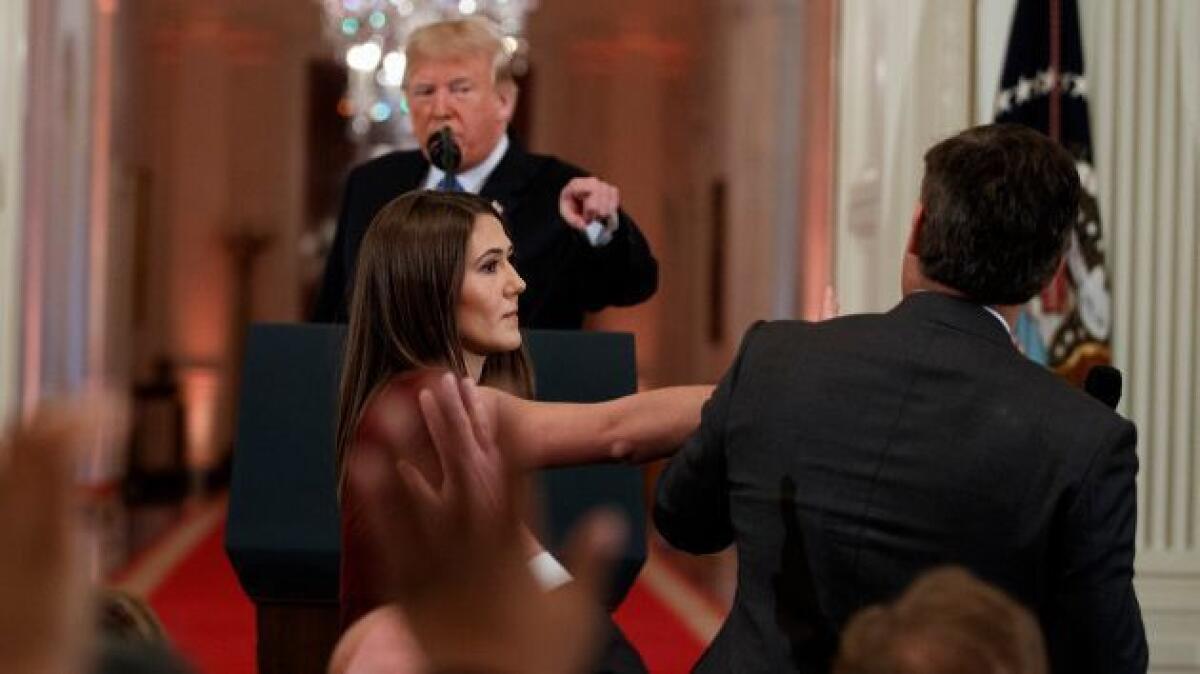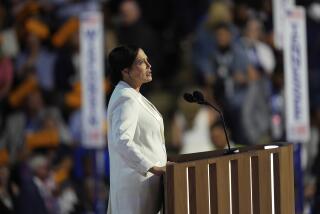White House, amid outcry, stands by edited video of CNN reporter to justify barring him

Reporting from Washington — A day after revoking the press credentials of CNN’s chief White House correspondent, Jim Acosta, the White House stood by its decision as critics assailed it both for falsely accusing him of mistreating an intern at President Trump’s news conference and for disseminating a doctored video of the incident.
Unedited video shows Acosta, who was attempting to question the president, gripping a microphone as a female intern tried to pry it away during the Wednesday event, and saying politely, “Excuse me, ma’am,” as he maneuvered to keep his hold. White House Press Secretary Sarah Huckabee Sanders later tweeted a shorter clip in which the speed was altered to make Acosta appear to chop hard at her arm.
Under fire for manufacturing a rationale to deny Acosta access to the White House complex, Sanders on Thursday refused to back down, even as the video she shared was reported to have come from the right-wing conspiracy website Infowars.com.
“The question is: did the reporter make contact or not?,” she said in a statement. “The video is clear, he did. We stand by our statement.”
In its original statement Wednesday night announcing the indefinite suspension of Acosta’s pass, the White House said it would “never tolerate a reporter placing his hands on a young woman just trying to do her job as a White House intern.”
Reuters correspondent Jeff Mason directly contradicted the White House account. “I was seated next to @Acosta at today’s press conference and did not witness him ‘placing his hands’ on the young intern, as the White House alleges,” Mason wrote on Twitter. “He held on to the microphone as she reached for it.”
Other unedited video clips of the exchange show that Acosta never placed a hand on the intern, who initiated the physical contact as she tried to take the microphone out of his hand.
During the president’s testy back-and-forth with Acosta that precipitated the microphone flap, Trump called the reporter — with whom he and Sanders have long had a contentious relationship — “a rude, terrible person” and an “enemy of the people.” Trump sought to call on another reporter, but Acosta persisted.
Revoking a pass is extremely rare, according to the White House Correspondents Assn. It called on the White House to reverse a “weak and misguided action.”
Other organizations and individual journalists have followed suit, expressing outrage both about the barring of Acosta and about Trump’s ongoing efforts to undermine a free press.
“The revocation of Mr. Acosta’s White House press pass, especially on fabricated grounds, is an absolute blow to freedom of the press,” said Margaux Ewen, director of the North American branch of Reporters Without Borders.
Ewen added, “This severe measure, paired with the president’s treatment of several other esteemed White House reporters, is unacceptable given the already hostile environment for reporters in the United States.”
PEN America, an organization of writers promoting human rights and literature, also issued a statement calling the action against Acosta “yet more evidence that the President and [this]administration feel no compunction about exacting punishment on journalists for hard-hitting coverage.”
CNN, in a statement Wednesday night, said that Sanders “lied” about the pretext for revoking Acosta’s credential. “She provided fraudulent accusations and cited an incident that never happened,” it said, calling Acosta’s questions the “real reason” he was punished and adding, “Jim Acosta has our full support.”
The action was the first time the White House had explicitly banned a reporter, but it isn’t a new exercise for Trump, whose campaign in 2016 denied credentials to a host of reporters and some news organizations, including the Washington Post, Politico and the Huffington Post, after coverage it disliked.
More to Read
Get the L.A. Times Politics newsletter
Deeply reported insights into legislation, politics and policy from Sacramento, Washington and beyond. In your inbox three times per week.
You may occasionally receive promotional content from the Los Angeles Times.











